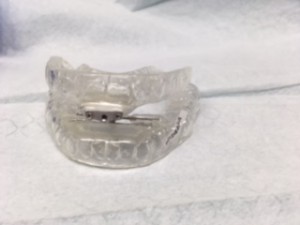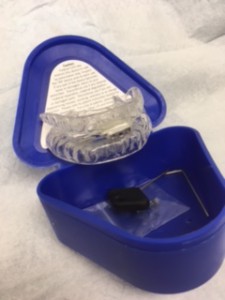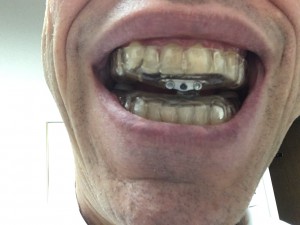Mandibular Advancement Device
Some obstructive sleep apnea sufferers are looking for a non-invasive (non-surgical) solution to control their sleep apnea symptoms and heavy snoring. Often, they are told to use CPAP (continuous positive airway pressure, also known as the “sleep mask” or “sleep machine”). But not everyone who needs treatment for sleep apnea can tolerate CPAP, or is willing to strap a mask to their head in order to get a good night’s sleep.
There is another solution. An oral appliance, known as a mandibular advancement device, can sometimes help. It is a device that you put in your mouth before going to sleep, and you wear it all night long, like a retainer. It is custom-molded to fit on your upper and lower teeth, with an adjustable connector between the two parts. You can fine-tune the setting of the device until your snoring and sleep apnea reduces to an acceptable level. You can see what the appliance looks like by checking the photos below.
Dr. Spingarn at Westchester ENT is now making these devices for sleep apnea sufferers. After an appropriate diagnostic evaluation and testing, Dr. Spingarn will let you know if you are a good candidate for a mandibular advancement device. If so, he will take impressions of your teeth, which will be sent to a special laboratory where the device is created, and then you will come back to the office to receive your device. In many cases, your health insurance coverage will pay for your treatment.*
In order to use a mandibular advancement device, you should have most of your teeth and they should be in good shape, with no dental decay or active dental problems. You also should have no history of jaw pain or the jaw-joint disorder known as temporomandibular dysfunction (often abbreviated as TMJ pain or TMD).
If you are coming to the office for a mandibular advancement device consultation, you can save yourself time and energy by preparing in advance. For instance, if you already have a diagnosis of obstructive sleep apnea, then try to bring a copy of your sleep test results with you. If you do not have a diagnosis yet, call our office before your visit so we can arrange for a sleep test to be authorized by your insurance company. With any luck, we can arrange for you to have the test performed on the same day that you come for your consultation. If you want your insurance coverage to pay for your mandibular advancement device, the insurance company will usually require a reason why you could not use CPAP, the standard treatment for obstructive sleep apnea. Be prepared to tell us why CPAP was not a good treatment for you. (Did it not work? Were you uncomfortable using it? Do you have claustrophobia?)
*If you are insured by government plans such as Medicare and Medicaid, or certain union plans such as GHI and Local 1199: unfortunately, your insurance plans do not permit us to provide these appliances to you, but you are welcome to come for a consultation to discuss alternative treatments.




